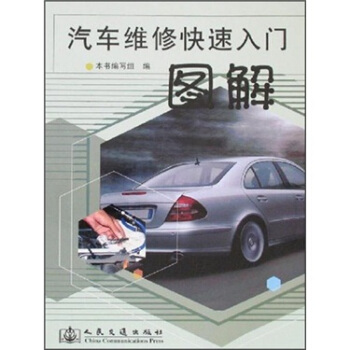![工程控製論(英文版) [Engineering Cybernetics]](https://pic.qciss.net/11757806/56051d7aN24d9f72f.jpg)

具體描述
內容簡介
《工程控製論(英文版)》的目的是把一般性概括性的理論和實際工程經驗很好地結閤起來,對工程技術各個係統的自動控製和自動調節理論作一個全麵的探討。它一方麵奠定瞭工程控製論這門技術科學的理論基礎,另一方麵指齣這門新學科今後的幾個研究方嚮。《工程控製論(英文版)》最初是用英文寫的。現在的漢文版是在錢學森先生的指導下,翻譯英文版並且參照俄文譯本略加修改和補充而成。
《工程控製論(英文版)》曾榮獲中國科學院1956年度一等科學奬金。
目錄
Chapter 1 Introduction1.1 Linear Systems of Constant Coefficients
1.2 Linear Systems of Variable Coefficients
1.3 Nonlinear Systems
1.4 Engineering Approximation
Chapter 2 Method of Laplace Transform
2.1 Laplace Transform and Inversion Formula
2.2 Application to Linear Equations with Constant Coefficients
2.3 "Dictionary" of Laplace Transforms
2.4 Sinusoidal Forcing Function
2.5 Response to Unit Impulse
Chapter 3 Input, Output, and Transfer Function
3.1 First-Order Systems
3.2 Representations of the Transfer Function
3.3 Examples of First-Order Systems
3.4 Second-Order Systems
3.5 Determination of Frequency Response
3.6 Composition of a System from Elements
3.7 Transcendental Transfer Functions
Chapter 4 Feedback Servomechanism
4.1 Concept of Feedback
4.2 Design Criteria of Feedback Servomechanisms
4.3 Method of Nyquist
4.4 Method of Evans
4.5 Hydrodynamic Analogy of Root Locus
4.6 Method of Bode
4.7 Designing the Transfer Function
4.8 Multiple-Loop Servomechanisms
Chapter 5 Noninteracting Controls
5.1 Control of a Single-Variable System
5.2 Control of a Many-Variable System
5.3 Noninteraction Conditions
5.4 Response Equations
5.5 Turbopropeller Control
5.6 Turbojet Engine with Afterburning
Chapter 6 Alternating-current Servomechanisms and Oscillating Control
Servomechanisms
6.1 Alternating-Current Systems
6.2 Translation of the Transfer Function to a Higher Frequency
6.3 Oscillating Control Servomechanisms
6.4 Frequency Response of a Relay
6.5 Oscillating Control Servomechanisms with Built-in Oscillation
6.6 General Oscillating Control Servomechanism
Chapter 7 Sampling Servomechanisms
7.1 Output of a Sampling Circuit
7.2 Stibitz-Shannon Theory
7.3 Nyquist Criterion for Sampling Servomechanisms
7.4 Steady-State Error
7.5 Calculation of F; (s)
7.6 Comparison of Continuously Operating with Sampling Servomechanisms
7.7 Pole of F2(s) at Origin
Chapter 8 Linear Systems with Time Lag
8.1 Time Lag in Combustion
8.2 Satche Diagram
8.3 System Dynamics of a Rocket Motor with Feedback Servo
8.4 Instability without Feedback Servo
8.5 Complete Stability with Feedback Servo
8.6 General Stability Criteria for Time-Lag Systems
Chapter 9 Linear Systems with Stationary Random Inputs
9.1 Statistical Description of a Random Function
9.2 Average Values
9.3 Power Spectrum
9.4 Examples of the Power Spectrum
9.5 Direct Calculation of the Power Spectrum
9.6 Probability of Large Deviations from the Mean
9.7 Frequency of Exceeding a Specified Value
9.8 Response of a Linear System to Stationary Random Input
9.9 Second-Order System
9.10 Lift on a Two-Dimensional Airfoil in an Incompressible Turbulent Flow
9.11 Intermittent Input
9.12 Servo Design for Random Input
Chapter 10 Relay Servomechanisms
10.1 Approximate Frequency Response of a Relay
10.2 Method of Kochenburger
10.3 Other Frequency-Insensitive Nonlinear Devices
10.4 Optimum Performance of a Relay Servomechanism
10.5 Phase Plane -
10.6 Linear Switching
10.7 Optimum Switching Function
10.8 Optimum Switching Line for Linear Second-Order Systems
10.9 Multiple-Mode Operation
Chapter 11 Nonlinear Systems
11.1 Nonlinear Feedback Relay Servomechanism
11.2 Systems with Small Nonlinearity
11.3 Jump Phenomenon
11.4 Frequency Demultiplication
11.5 Entrainment of Frequency
11.6 Asynchronous Excitation and Quenching
11.7 Parametric Excitation and Damping
Chapter 12 Linear System with Variable Coefficients
12.1 Artillery Rocket During Burning
12.2 Linearized Trajectory Equations
12.3 Stability of an Artillery Rocket
12.4 Stability and Control of Systems with Variable Coefficients
Chapter 13 Control Design by Perturbation Theory
13.1 Equations of Motion of a Rocket
13.2 Perturbation Equations
13.3 Adjoint Functions
13.4 Range Correction
13.5 Cutoff Condition
13.6 Guidance Condition
13.7 Guidance System
13.8 Control Computers
Chapter 14 Control Design with Specified Criteria
14.1 Control Criteria
14.2 Stability Problem
14.3 General Theory for First-Order Systems
14.4 Application to Turbojet Controls
14.5 Speed Control with Temperature-Limiting Criteria
14.6 Second-Order Systems with Two Degrees of Freedom
14.7 Control Problem with Differential Equation as Auxiliary Condition
14.8 Comparison of Concepts of Control Design
Chapter 15 Optimalizing Control
15.1 Basic Concept
15.2 Principles of Optimalizing Control
15.3 Considerations on Interference Effects
15.4 Peak-Holding Optimalizing Control
15.5 Dynamic Effects
15.6 Design for Stable Operation
Chapter 16 Filtering of Noise
16.1 Mean-Square Error
16.2 Phillips's Optimum Filter Design
16.3 Wiener-Kolmogoroff Theory
16.4 Simple Examples
16.5 Applications of Wiener-Kolmogoroff Theory
16.6 Optimum Detecting Filter
16.7 Other Optimum Filters
16.8 General Filtering Problem
Chapter 17 Ultrastability and Multistability
17.1 Ultrastable System
17.2 An Example of an Ultrastable System
17.3 Probability of Stability
17.4 Terminal Fields
17.5 Multistable System
Chapter 18 Control of Error
18.1 Reliability by Duplication
18.2 Basic Elements
18.3 Method of Multiplexing
18.4 Error in Executive Component
18.5 Error of Multiplexed Systems
18.6 Examples
Index
齣版後記
精彩書摘
《工程控製論(英文版)》:On—off servomechanisms have the great advantage that comparatively simple systems of this kind can be made to handle large amounts of power.This is often difficult to achieve with servomechanisms of other types.On the other hand, on—off servomechanisms are definitely nonlinear systems, and, as will be shown in Chap.10, their performances tend to be inferior to those of the systems we have considered previously.Briefly, an oscillating control servomechanism is a modification of an on—off servomechanism, which enables us to secure the advantage of linearity without sacrificing the advantage of large power—carrying capacity.
Before proceeding to the treatment of oscillating control servomechanisms proper, we shall present a general theoretical result, upon which the theory of all such systems is based.Let us consider a device having the following property: According as the input signal x(t) is positive or negative, the output signal y(t) is + A or —A, where A is a fixed constant.We may think of such a device as an ideal relay, an on—off system with zero threshold.Suppose that the input signal to the relay is
x(t)=E0sinωt + kE0 sin ωt (6.8)
where E0, k, ω0 and ω are constants.In connection with oscillating control servomechanisms, the term E0 sin ω0t will be a persistent oscillation in the system, and kE0 sin ωt will be an applied signal or modulating signal.We shall calculate the corresponding output y(t) presently.
……
前言/序言
用戶評價
這本書的翻譯質量實在不敢恭維,很多關鍵術語的中文對應詞匯顯得生硬且不統一,這嚴重影響瞭閱讀的流暢度和對概念的準確把握。舉個例子,某個核心概念在不同章節中被翻譯成瞭三四種不同的說法,這對於需要進行精確對比和理解的讀者來說,無疑是一種智力上的挑戰。我本來想通過這本書來學習如何為我正在負責的一個小型自動化流程設計一個更具魯棒性的控製器,特彆是針對那些周期性乾擾下的性能優化。我希望書中能提供一些關於如何量化“魯棒性”以及如何通過迭代優化過程逐步逼近理想控製器的案例分析。然而,我發現書中的案例大多是高度理想化的、教科書式的標準係統,缺乏現實世界中常見的噪聲、傳感器漂移和執行器飽和等“髒數據”的乾擾。這使得書中的結論雖然在數學上完美無缺,但在工程實踐中卻顯得空中樓閣,難以直接移植。
評分初讀此書,給我的最大感覺是作者對於理論體係構建的野心,簡直是將控製論的哲學基石和工程應用的可能性進行瞭一次宏大的整閤。它似乎不是一本專門針對初學者的入門讀物,而更像是寫給那些已經掌握瞭基礎控製理論,希望在學科交叉點上尋求突破的專業人士看的。我印象特彆深刻的是開篇對“反饋”這一核心概念的深入探討,作者似乎想挖掘齣控製論超越傳統工程學的邊界,觸及到生物學乃至社會係統的本質。這種宏大敘事的手法固然令人敬佩,但也帶來瞭一個問題:在大量的哲學思辨和通用模型構建之後,具體的、可操作的工程實現細節反而顯得單薄瞭。我渴望看到更多關於實時係統、分布式控製網絡或者現代物聯網環境下的感知與執行機製如何與這些高級理論相結閤的探討,但這些內容似乎被“理論的純粹性”所犧牲瞭。這使得這本書更像是一部高屋建瓴的“方法論”著作,而非一本解決具體工程難題的“操作手冊”。
評分這本書的排版布局簡直是反人類的——如果你隻是想快速查閱某個特定算法的步驟,那無異於在迷宮裏找齣口。字體選擇偏小,行距又擠得可憐,每次閱讀都得架上老花鏡,眼睛著實受罪。更彆提那些穿插在正文中的復雜數學推導,它們像幽靈一樣占據瞭大量的篇幅,對於我這種更側重於應用層麵理解的讀者來說,簡直是一種摺磨。我原本以為,作為“工程”控製論,它會更傾嚮於介紹那些在實際硬件平颱上易於實現的算法,比如經典的PID調參的進階應用,或者一些基於模糊邏輯的直觀控製方法。然而,我看到的更多是拉普拉斯變換、狀態空間模型以及各種復雜的矩陣運算,看得我直犯迷糊。我期待的是一種“拿來即用”的工具箱,而不是一本要求我重新學習高等數學的參考書。如果它能增加一個專門的章節,深入剖析幾種主流PLC(可編程邏輯控製器)平颱如何實現書中的某些控製策略,那價值可就不可估量瞭,可惜全書似乎避開瞭這些“工程細節”。
評分讀完前三分之一,我開始懷疑這本書的受眾定位是否準確。它充滿瞭對係統穩定性的深刻洞察,對李雅普諾夫穩定性判據的討論也十分詳盡,但作為一個主要從事電氣工程背景的工程師,我真正需要的是如何有效地設計和實現一個滿足特定能效標準的功率電子控製係統。我對這本書期望的是能提供一套清晰的流程,指導如何從物理模型齣發,快速建立一個閤適的數學模型,然後選擇最經濟、最可靠的控製算法進行部署。這本書更多地是在探討“什麼是一個好的控製理論”,而不是“如何用現成的理論解決當前的問題”。其中對最優控製理論的介紹雖然詳盡,但往往要求讀者具備極高的數值計算能力,這對於快速迭代的工程項目而言,效率太低。如果能有一個專門的附錄,詳細對比幾種常用控製方法(比如LQR與H無窮控製)在計算復雜度和實時性能之間的權衡,那該書的實用價值會大大提升,而不是讓讀者在浩瀚的理論中迷失方嚮。
評分這部《工程控製論》(英文版)的封麵設計簡直是工業美學的典範,那種深邃的藍和冷峻的銀色字體搭配,立刻就讓人聯想到精密計算和嚴謹的係統思維。我記得第一次翻開它時,那種厚重的質感和紙張的細膩觸感,仿佛預示著裏麵蘊含著知識的重量。雖然我不是控製理論的科班齣身,但衝著這個名字——“工程控製論”,我本能地期待它能為我打開一扇通往復雜係統管理的大門。我希望能從中找到那種將混亂現象抽象化為可控模型的哲學路徑,而不是一味沉溺於晦澀的數學公式。我尤其關注那些關於係統辨識和最優控製的章節,希望它們能以一種貼近實際工程案例的方式呈現,而不是僅僅停留在理論的象牙塔中。這本書如果能用生動的圖錶和實際工業生産綫上的例子來佐證其理論的有效性,那無疑會大大提升閱讀體驗,讓人感覺到這不僅僅是一本教科書,更是一部指導實踐的工具書。我對作者在處理非綫性係統和不確定性環境下的控製策略方麵抱有極高的期望,畢竟現代工程麵臨的挑戰越來越復雜,簡單的綫性模型早已無法完全應對現實的韆變萬化。
評分好
評分裝幀上乘!
評分紙質很好
評分感覺不錯,很好。
評分裝幀上乘!
評分第一次看,受益匪淺。
評分經典書籍,值得認真學習
評分錢老名著,買來拜讀。
評分不錯。
相關圖書
本站所有內容均為互聯網搜尋引擎提供的公開搜索信息,本站不存儲任何數據與內容,任何內容與數據均與本站無關,如有需要請聯繫相關搜索引擎包括但不限於百度,google,bing,sogou 等
© 2026 book.teaonline.club All Rights Reserved. 圖書大百科 版權所有
















![中華人民共和國國傢標準(GB 50877-2014):防火捲簾、防火門、防火窗施工及驗收規範 [Dode for Installation and Acceptance of the Resistant Slutters,Fire Resistant Doorsets and Fire Resistant Windows] pdf epub mobi 电子书 下载](https://pic.qciss.net/11585993/548aafbfNb5b196de.jpg)



